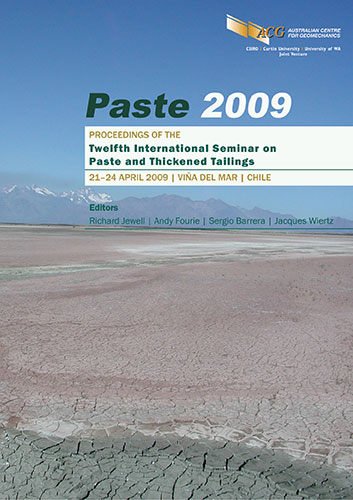Polymer Aids for Flocculation of Oil Sands Tailings

|
Authors: Wang, X; Xu, Z; Masliyah, JH Paper is not available for download Contact Us |
DOI https://doi.org/10.36487/ACG_repo/963_11
Cite As:
Wang, X, Xu, Z & Masliyah, JH 2009, 'Polymer Aids for Flocculation of Oil Sands Tailings', in R Jewell, AB Fourie, S Barrera & J Wiertz (eds), Paste 2009: Proceedings of the Twelfth International Seminar on Paste and Thickened Tailings, Australian Centre for Geomechanics, Perth, pp. 93-100, https://doi.org/10.36487/ACG_repo/963_11
Abstract:
Storage and disposal of large volume tailings are a huge environmental problem facing the surface-mining oil sands industry. It is expected that the volume of tailings ponds to exceed one billion m3 by 2020. Major efforts are presently being made to reclaim the tailings ponds using emerging technologies. Commercial Magnafloc 1011 and in-house synthesised Al-PAM were tested for their flocculation in assisting the settling of laboratory extraction oil sands tailings and tailings from froth treatment unit. Both polymers showed excellent ability to enhance fine solids settling. As the fine solids and bitumen content in the tailings increase, the dosage required to achieve a desired settling rate increases. The supernatant of tailings treated with Magnafloc 1011 was not as clear as those treated with Al-PAM, indicating more suspended solids remaining in the supernatant. For Magnafloc 1011, transmission electron microscopy (TEM) analysis of the solids from supernatants showed a significant fraction of bitumen and bitumen contaminated fine particles in the supernatant. When Al-PAM was added, on the other hand, very few bitumen droplets and particles were left in the supernatants. It appears that Al-PAM could affect both bitumen and fine solids, while Magnafloc 1011 preferentially adsorbs on solids rather than on bitumen in the tailings water. The findings were confirmed by atomic force microscope studies. The different type of interaction of Al-PAM and Magnafloc 1011 with fine solids in the tailings water is responsible for their performance as flocculant for oil sands tailings.
References:
Camp, F.W. (1977) Processing Athabasca Tar Sands - Tailings Disposal, Canadian Journal of Chemical Engineering
55(5), pp. 581–591.
Clark, K.A. and Pasternack, D.S. (1932) Hot water separation of bitumen from Alberta bituminous sand, Industrial and
Engineering Chemistry 24, pp. 1410–1416.
Cymerman, G., Kwong, T., Lord, E., Hamza, H. and Xu, Y. (1999) Thickening and disposal of fine tails from oil sand
processing, Polymers in Mineral Processing, Canadian Institute of Mining, Metallurgy and Petroleum,
Edmonton, Alberta, Canada, 1999, pp. 605–619.
ERCB, ERCB Backgrounder on Draft Directive: Tailings Performance Criteria and Requirements for Oil Sands Mining
Schemes, viewed 24 November 2008,
FTFC (Fine Tailings Fundamentals Consortium): Advances in Oil Sands Tailings Research (1995) Alberta Department
of Energy, Oil Sands and Research Division.
Kotlyar, L.S., Deslandes, Y., Sparks, B.D., Kodama, H. and Schutte, R. (1993a) Characterization of Colloidal Solids
from Athabasca Fine Tails. Clays and Clay Minerals 41(3), pp. 341–345.
Kotlyar, L.S., Sparks, B.D. and Kodama H. (1990) Isolation and characterization of organic-rich solids present in
Athabasca tailings pond sludge, AOSTRA Journal of Research 6(1), pp. 41–51.
Paste 2009, Viña del Mar, Chile 99
Polymer Aids for Flocculation of Oil Sands Tailings X. Wang et al.
Kotlyar, L.S., Sparkes, B.D, Schutte, R. and Woods, J.R. (1993b) Understanding of fundamentals: key to process
modification for tailings reduction, Journal of Environmental Science and Health, Part A: Environmental Science
and Engineering A28 (10), pp. 2215–24.
Kotlyar, L.S., Sparks, B.D, Woods, J., Capes, C.E. and Schutte, R. (1995) Biwetted Ultrafine Solids and Structure
Formation in Oil Sands Fine Tailings, Fuel 74(8), pp. 1146–1149.
Li, H., Xu, Z. and Masliyah, J.H. (2005) Synergetic role of polymer flocculant in low-temperature bitumen extraction
and tailings treatment, Energy & Fuels 19(3), pp. 936–943.
Li, H., Xu, Z. and Masliyah, J.H. (2008) Novel polymer aids for low-grade oil sand ore processing, Canadian Journal of
Chemical Engineering 86(2), pp. 168–176.
Mikula, R.J., Munoz, V.A. and Omotoso, O. (2008) Centrifuge options for production of ‘Dry stackable tailings’ in
surface mined oil sands tailings management, Proceedings of the World Heavy Oil Congress, Edmonton,
Canada, March 10–12, Paper 2008–435.
Sworska, A., Laskowski, J.S. and Cymerman, G. (2000) Flocculation of the Syncrude fine tailings Part I. Effect of pH,
polymer dosage and Mg2+ and Ca2+ cations, International Journal of Mineral Processing 60(2), pp. 143–152.
Yang, W.Y., Qian, J.W. and Shen, Z.Q. (2004) A novel flocculant of Al (OH)(3)-polyacrylamide ionic hybrid, Journal
of Colloid and Interface Science 273(2), pp. 400–405.
100 Paste 2009, Viña del Mar, Chile
© Copyright 2026, Australian Centre for Geomechanics (ACG), The University of Western Australia. All rights reserved.
View copyright/legal information
Please direct any queries or error reports to repository-acg@uwa.edu.au
View copyright/legal information
Please direct any queries or error reports to repository-acg@uwa.edu.au